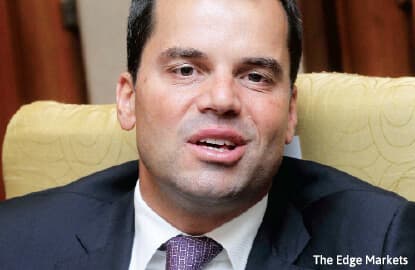
ONE of the world’s top 10 food giants, Brazil’s BRF SA, has been drawn to Malaysia because of its high chicken consumption per capita and well-recognised halal certification.
Nestlé (M) Bhd’s success as a global halal product hub for the Nestlé group has also inspired the Brazil-based food company to establish a foothold here.
BRF chose to partner with PPB Group Bhd to expand its halal food business in Malaysia and Asean because the Kuok group, which controls the latter, supplies commodities in Brazil. The partnership was initiated due to BRF’s long-standing relationship with Kuok.
“We are the biggest player in Brazil, so through the relationship, we know FFM (Bhd) and its brand. We felt it is a good starting point for a Malaysian venture,” BRF’s global CEO Pedro Faria says in an interview with The Edge.
Two weeks ago, BRF’s subsidiary, BRF Foods Gmbh, acquired a 70% stake in FFM Further Processing Sdn Bhd (FFP), a unit of FFM Bhd. PPB holds an 80% stake in FFM. The 70% stake was priced at US$16 million (RM66.24 million). Upon completion, FFM will hold the remaining 30% stake in FFP, a food processing company in Selangor.
BRF, formerly known as Brasil Foods SA, is listed in Brazil and New York and had a market capitalisation of US$13.77 billion as at last Wednesday.
After the initial investment of US$16 million, Faria says, the group will continue to invest more to boost FFP’s capacity over time. It also intends to introduce its leading halal brand, Sadia, to the Malaysian market.
“We intend to transform Malaysia into a halal hub (for BRF), so we can export products to the Southeast Asian and Middle East markets, such as Singapore, Indonesia and Thailand,” Faria says.
FFP, which manufactures and processes nuggets, sausages and burgers, currently markets its products under the brand names Marina and Seri Murni.
“We will keep the current brands, which already have a big potential market, but at the same time we will expand with more brands,” Faria says.
He says the group will also ramp up FFP’s processed chicken capacity eightfold to 80,000 tonnes, similar to the plant BRF owns in Abu Dhabi, the largest processing and manufacturing plant in the Middle East. Faria says BRF is the largest halal food company in the world. “This is a multiyear and flexible target, we will invest gradually. If the Asean Economic Community and Trans-Pacific Partnership happen, we can grow capacity to more than 80,000 tonnes,” Faria says.
According him, FFP’s strength lies in distribution and he believes BRF’s investment, support and global expertise can push the former to a new level of growth.
He sees huge potential for FFP, not only in the domestic market but in export markets as well.
BRF’s products are available in more than 150 countries on five continents.
Faria points out that Malaysia is actually in the top three in the world in terms of chicken consumption per capita. Given the size of the market and BRF’s ambitions, the venture is likely to grow as big as the one in Abu Dhabi.
Consumer products accounted for only 14% and 3% respectively of PPB’s total revenue and profit for the first six months ended June 30. Grains and agri-business, which are housed under its 18.6%-owned associate Wilmar International Ltd, are the key income earners, contributing 65% of its revenue and 55% of profit.
PPB Group slipped into the red in the second quarter ended June 30 (2QFY2016), posting a net loss of RM78.72 million, compared with a net profit of RM182.64 million in 2QFY2015. The group’s net profit for the first half also slumped 59.69% to RM167.52 million.
This is because its associates and joint venture recorded a net loss of RM154 million in 2QFY2016 compared with a RM138 million profit in 2QFY2015. Wilmar’s net loss was largely from its manufacturing business within the oilseeds and grains segment.
Analysts say the partnership with BRF is a strategic tie-up but note that the immediate earnings impact on PPB is expected to be limited.
“We have to see how much they can expand as the partnership is currently only 30%. Secondly, whether they can actually expand the business remains to be seen,” says an analyst.
Although Kuok may leverage the relationship more in the future, he says, it will benefit Wilmar more, rather than PPB directly.
In terms of poultry expansion, another analyst says the poultry market in Malaysia is saturated, so it will only add value if the JV is able to export to other markets.
MIDF Research’s analyst Alan Lim, however, is positive on the long-term development of the partnership.
“We expect the venture will improve PPB’s consumer products margin slightly,” he says.
Nonetheless, Lim believes the immediate earnings impact on PPB will only be realised in three years, at the least (when capacity has reached 80,000 tonnes). But now, grains and agri-business remain PPB’s biggest contributor.
Save by subscribing to us for your print and/or digital copy.
P/S: The Edge is also available on Apple's AppStore and Androids' Google Play.